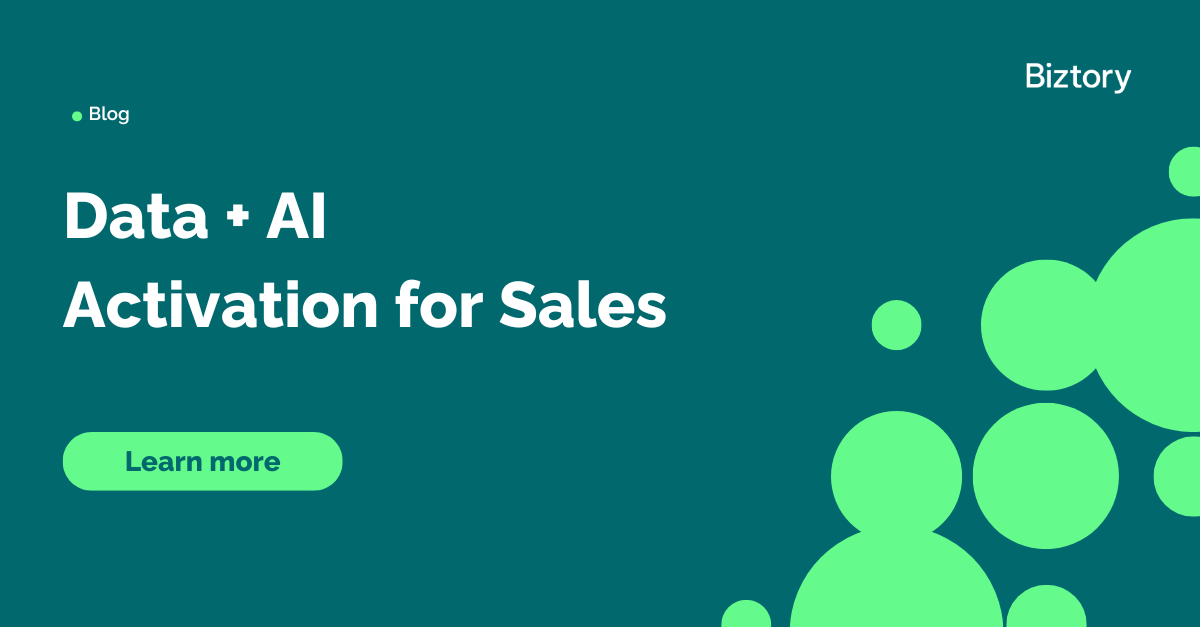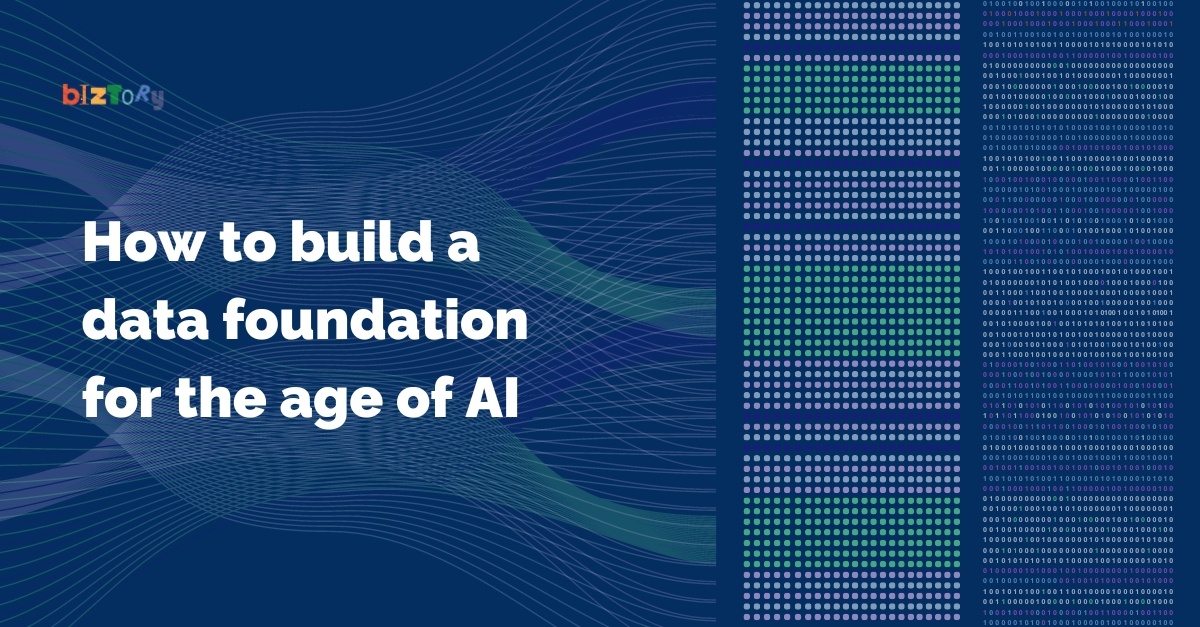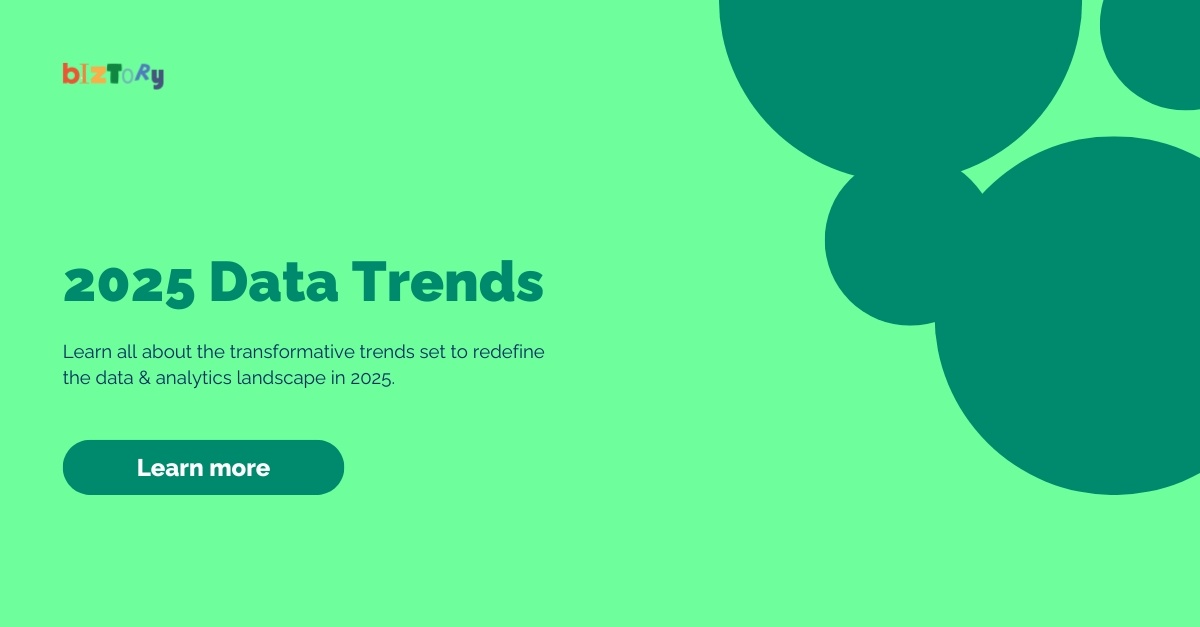Introduction
When looking into different Salesforce applications, Einstein Analytics is a name that pops up a lot. Obviously, we know who Einstein was in the real world but what does it stand for in the Salesforce universe?
Einstein is often synonym of genius. Practically this refers to somebody who has exceptional mental skills. Salesforce has used this reference to create their Einstein product, an artificial intelligence engine created for the Salesforce environment.
The combination of customer data, artificial intelligence (Einstein) and the Salesforce platform result in the world’s smartest CRM. Einstein Analytics is going to leverage data generated by Salesforce products.
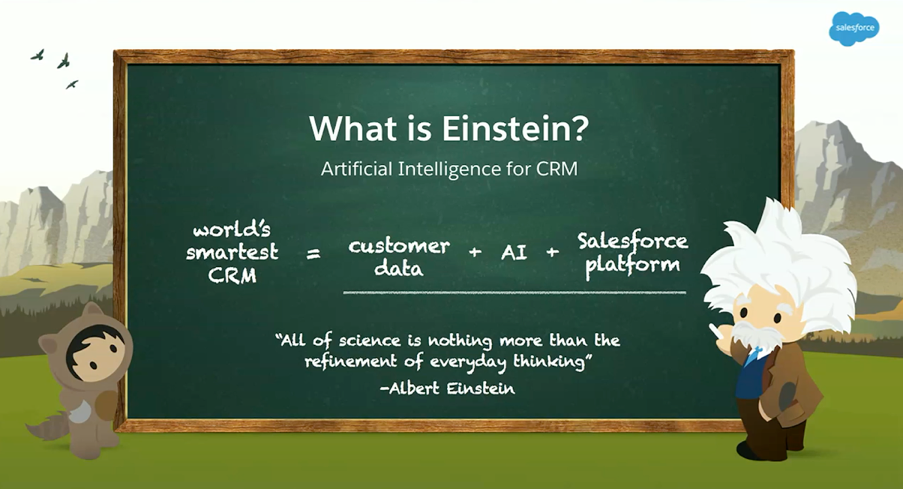
World’s Smartest CRM, Salesforce Image
Practical Examples
Before discussing where Einstein fits into the Salesforce universe, let’s make things more practical. In the section below, some use cases are highlighted depending on the Salesforce product.
Sales Cloud
Within Sales Cloud, Einstein Analytics can be used to send pro-active alerts to salespeople on when to request a meeting with a (potential) client. Adding a flavor of text analysis, gives the user also the possibility of getting an alert when the competition is mentioned and/or other people are added to the mail thread.
Another possibility of Einstein Analytics in combination with Sales Cloud is the generation of Lead Scoring. A lead scoring system will calculate the possibility of turning that lead into an actual client. By using this feature, salespeople can target leads even better as before.
A third feature Einstein Analytics adds to Salesforce is something called best next step. What step should a salesperson take when a lead is hot? What step should be taken in order to extend the current account?
The possibilities of Einstein Analytics together with Sales Cloud are endless. A small video on this can be found right here.
Service Cloud
The combination of Einstein Analytics and Service Cloud lets customers have a better experience when contacting a service desk. By adding a layer of artificial intelligence to available data, a new world of possibilities opens up.
Customers can use the Einstein Chat Bot in order to connect with customer service. This will help solving small, very basic questions in an effective and efficient way by using an application, by SMS and/or by using voice commands (Einstein Analytics can be integrated with f.e. Amazon Alexa).
Einstein can also classify incoming cases depending on certain characteristics. This leads cases to the right agent directly, increasing performance and efficiency once again.
By using case history, suggestions on how to solve current cases can be given in an automatic fashion. These recommendations can be configured easily by using the Salesforce graphical user interface.
More information on Einstein Analytics in combination with Service cloud can be found here.
Marketing Cloud
Einstein Analytics & Marketing Cloud will increase the possibility of marketeers to grow their customers. Based on the usage data each profile in Marketing Cloud can get a prediction on the probability of someone opening, unsubscribing, clicking an email. This makes it easier for marketeers to target customers.
By using these predictions, it’s possible to target the best customers for a certain product. It’s even possible to create a lookalike audience based on internet data of new prospects. These prospects have a great likelihood of being interested.
A third use case where Einstein Analytics increases the power of Marketing Cloud is the optimisation of the customer journey. Again using the above predictions, a different journey can be set per customer(-segment) depending on clicking an email, opening an email, … . The idea is to get in touch with the customer using the channel of their preference. This will result in personalised marketing based on web-activity, client profile, purchase history.
A small appetizer on Einstein and Marketing Cloud, can be found here.
Commerce Cloud
Einstein and Commerce Cloud has a single goal; aligning the shopper’s needs with the customer’s offer. This is done by anticipating on what a shopper actually wants. Based on customer data (purchases, location, price, product, …), merchants can easily create a personalised recommendation. This results in different shoppers, browsing the same item on a shopping site but seeing different recommended products.
When a shopper is looking for a certain item in a web shop, Einstein Analytics will change the search suggestions based on the customer data and the likelihood of what that customer is going to search for.
For more information on what Einstein Analytics can do in combination with Commerce Cloud, you can check the following video.
Einstein Components
As you might already notice, Einstein Analytics is an important part and differentiator of Salesforce. Because of its importance, it is completely embedded into all different Salesforce products. The image below shows the main Einstein architecture. You might notice that Einstein is a building block running through the different Salesforce products.
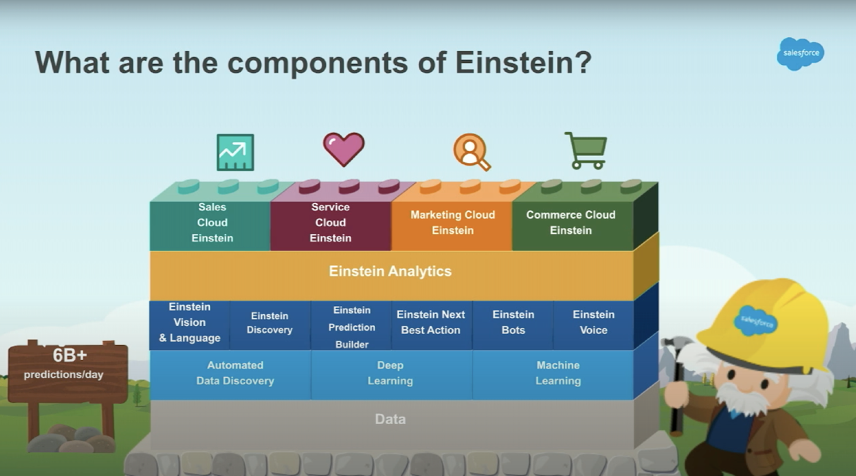
Einstein Architecture, Salesforce Image
The image above clearly shows that data is the building block of everything. Without data, Einstein Analytics will not be able to perform accurate predictions. The more data, the merrier. This data is entered by users of the Salesforce platform. Einstein will train itself based on that data. The more data Einstein can leverage, the more it’s trained even in exceptional cases.
Using that data, different logarithms are used to calculate predictions, recommender systems, … . This is the second layer in the image above. These logarithms are divided into 6 blocks.
- Einstein Vision & Language: This block will be responsible for image classification & NLP (Natural Language Processing). Einstein recognises logo’s on images and sentiments out of reviews using Einstein Vision & Language.
- Einstein Discovery: This block will be used for descriptive analysis, predictive analysis (future results) and comparison analytics (factors influencing gaps between variables). Einstein will use Einstein Discovery for example to predict future sales.
- Einstein Prediction Builder: This block will give the user the possibility to adapt the way Einstein calculates predictions. This is done in personalising the shopping experience for shoppers or to adapt the customer path in Marketing Cloud.
- Einstein Next Best Action: This block will suggest the next step to be taken in a certain process. Concretely this can be used in a sales environment. What next step should a salesperson take to acquire a certain prospect?
- Einstein Bots: This block will give the user the possibility of developing their own chat bots. These can be used in a service environment. When a customer wants to reach a company, the company should be reachable by the channel of preference of that customer. Chatbots are a part of that. They can answer small, basic and frequently asked questions.
- Einstein Voice: This block will give the user the possibility of developing their own bot using voice commands. Basically, this block is functionally more or less the same as the Einstein Bots. Einstein Voice will use speech recognition to analyse questions in f.e. a service environment.
Combining all these blocks results in Einstein Analytics. Knowing this, we can state that Einstein Analytics is a combination of different building blocks that each contain their own purpose (based on their algorithm). This Einstein Analytics platform can serve all products of Salesforce like Sales Cloud, Service Cloud, Marketing Cloud and Commerce Cloud.
Conclusion
In conclusion, Einstein Analytics is the icing of the Salesforce cake (that already tasted quite good). By combining data that is already available in most CRM’s with one of the most advanced artificial intelligence engines to date, insights are possible that were never possible before.
Since Salesforce recently bought Tableau, interesting developments are on the horizon. Integrating the Einstein Analytics engine with Tableau for even better visualisations, will be a unique selling point for as well for Salesforce as Tableau.
For more questions about Einstein Analytics, Salesforce and Tableau, please contact us on sales@biztory.com

